Cycling injuries account for 20 percent of all transport-related injuries, with over 12,000 hospitalizations each year. While the incidence of accidents for pedestrians and drivers are continually going down each year, the same isn’t right for cyclists. Cycling-related hospitalizations have risen by more than 4 percent each year for the last six years — a clear sign that cyclists need to take safety seriously.
Check Your Ride
Before you go out cycling, make sure your bike is in good condition. Check to see if the brakes and gears are working correctly and if the tires are properly inflated. Deflated tires drag you down and can make your bike a bit unresponsive. Bring along spare inner tubes and a pump for long trips.
Gear Up
Bicycles have no seatbelts or airbags. There’s nothing between you and the road or other vehicles. All that you can rely on is safety gear. Helmets are essential and also required by law. They reduce head injuries by 50 percent and injuries to the face and neck by 33 percent. A UNSW Sydney study showed helmets reduced fatalities by 46 percent and saving billions of dollars in medical costs. Get a decent pair of cycling glasses; they protect you from glare, insects, and the occasional grit thrown up by a speeding car. Getting distracted can be fatal for cyclists and getting something in your eye is very distracting. Visibility is essential, especially when you go out at night. That means seeing the road as well as getting noticed by others. Wear something colorful and reflective like a safety vest and install frontlights to light the way and backlights to alert other vehicles you’re there.
Know Your Route
Familiarity will reduce your chances of getting into an accident. Use the same route as much as possible and get to know the ins and outs of the roads you are using. If you don’t need to think about which way to go, you can focus on the road and the vehicles around you.

Hydrate
Dehydration is not something to scoff at, especially under the harsh Australian sun. It can make you dizzy and dull your reflexes. Drink 500ml to a liter of water a couple of hours before your ride and bring along an electrolyte drink. Water doesn’t have the sodium, potassium, magnesium, and chloride, and too much of a drop can significantly affect your performance. If ever you feel faint or dizzy, immediately stop riding and try to go somewhere cool.
Stay Sharp
Texting, inattentional blindness, road rage — they all make a cyclist’s life more dangerous. Keep your focus on the road as much as you can and try to avoid unnecessary distractions. A little paranoia will do you good, especially during rush hour. If you need to listen to music, use a bike speaker instead of headphones. This way you can still hear ambient sounds.
Cycling accidents are rising. Don’t be part of the statistic. Instead, do your best to keep yourself safe make that statistic drop.



